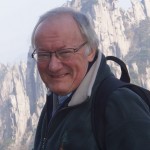I am Bartlett Professor (of Planning) at University College London where I chair the Centre for Advanced Spatial Analysis (CASA). I started this when I came back from the US 20 years ago and some days I think we are making progress. This web site tells you a little about this.I was born and brought up in Liverpool, a great city that produces a peculiar inspirational blend of humour that can be both penetrating and endearing. In 1950s socialist Britain, I had the privilege of going to a great grammar school, the so-called ‘Eton of the Labour Party’. This was then a living embodiment of taking kids from lowly backgrounds and propelling them onwards to realise their potential. Here is a picture of me in May 1957 from our school photograph, but if you click on the image, then this will take you to the bigger picture. Lots of famous people are there in their school-boy days. Look at the seventh boy from the left, three rows down ….. and there are many more there, less well-known perhaps but who have made many contributions. but if you click on the image, then this will take you to the bigger picture. Lots of famous people are there in their school-boy days. Look at the seventh boy from the left, three rows down ….. and there are many more there, less well-known perhaps but who have made many contributions.
I was good at art and drawing at school and was advised – told actually – to study architecture and town planning which seemed to combine enough intellectual clout like physics with the ability to wield a pencil. Hence at the early age of 17, I went to the University of Manchester in 1962 and there I joined the long term mission to make planning rational and the study of cities scientific.It has taken more than 50 years for us to even begin to approach this goal but I am more confident than ever that what is happening now in economics, physics, the sciences of complexity, with new and powerful methods for the acquisition of fine scale spatial data, will eventually lead to what Hari Seldon in Isaac Asimov’s Foundation trilogy called the ‘science of psychohistory’, what Herbert Simon called ‘The Sciences of the Artificial’, and what Jane Jacobs referred to as the organised complexity of cities.
It will take another 50 years, for sure, to make significant progress but much of what I do and what is done in CASA is supportive of this wider quest. (I am intrigued by the fact that Paul Krugman also takes some solace from Asimov’s Foundation Trilogy in forming his ideas about what is needed in terms of a science of society – economics in his case, cities in mine).I spent seven years in Manchester – golden years – the 1960s. It was George Chadwick and Brian McLoughlin, my Manchester mentors, who both pioneered systems approaches to planning that convinced me that the social sciences in general, cities and planning in particular, were domains that required systematic thinking.This led me to large scale urban models which saw me move to the University of Reading in 1969 to join the Urban Systems Research Unit where Peter Hall had just been appointed to the Chair of Geography.
Ten Years in Reading ending as a Reader with a one year sojourn in civil engineering in southern Ontario at Waterloo led me to Cardiff – to UWIST– where I cut my teeth as a Professor and had all kinds of administrative tasks like HOD and Dean (I am now an Honorary Professor there – they have forgiven me). Ten years of this convinced me that no one should spend their lives doing administration for it is essential to renew and refresh our core mission. In my case, this is ‘a’ or ‘the’ Science of Cities, or perhaps even a ‘New Science’, of which of course there are many as any one reading this weblog will soon discover.Anyway Cardiff despite the fact that it was a great department with some really top class academics, was hard work when one had to act as an administrator and a researcher.
So ‘Enough’ I said and off to America I went where I was Director of the NSF Centre the NCGIA for 5 years in SUNY-Buffalo. And then back in 1995 to UCL to start and direct CASA with all the trials and tribulations of starting a new unit in a place where everything and nothing has changed in a 100 years. I’m still here, just. It’s a good but hostile place as long as you like anarchy. As they say, the rest is history. I have various ‘Gongs’ for what I consider to be not only mine but others’ work. I was elected a Fellow of the British Academy in 2001 and was awarded a CBE for ‘services to geography’ in 2004. In 2009, I was elected, much to my surprise, a Fellow of the Royal Society.In 2010-2011, I received the Alonso Memorial Prize for my 2005 book Cities and Complexity from the Regional Science Association. I am especially pleased by this award. Alonso was one of my heroes when I was a graduate student and his book Location and Land Use in 1964 told us in no uncertain terms that economics and behaviour are central to any theory of cities. We ignore this at our peril.
I got the 2012 Research Award from the University Consortium in Geographic Information Science, and was also awarded the the Lauréat Prix International de Géographie Vautrin Lud in 2013. This is a strange but rather interesting prize; if you want to look at its origins then click here for the Wiki page. This past year (2015) I received the Founders Medal of the Royal Geographical Society for my work on cities and computer modelling. There is a little piece on this in The Geographical Journal and if you click here you can find out what this is all about too.
Here is a picture of me now and if you want my CV you can download by clicking the link. I also refer to my Wikipedia Page below. I have recently written a potted biography and this gives much more detail about the things that I am interested in, the places I have lived and worked, and the questions that still drive me.
  BATTY-CV-2020 BATTY-CV-2020
 
|